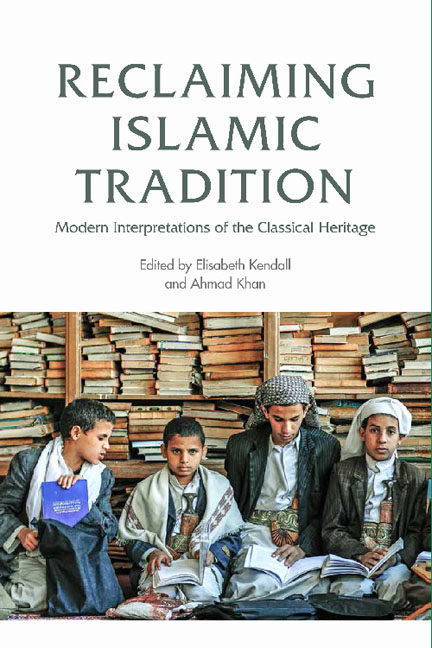Book contents
- Frontmatter
- Contents
- Acknowledgements
- About the Contributors
- Introduction
- 1 Modern Shiʿite Legal Theory and the Classical Tradition
- 2 Muḥammad Nāṣīr al-Dīn al-Albānī and Traditional Hadith Criticism
- 3 Islamic Tradition in an Age of Print: Editing, Printing and Publishing the Classical Heritage
- 4 Reaching into the Obscure Past: The Islamic Legal Heritage and Reform in the Modern Period
- 5 Reading Sūrat al-Anʿām with Muḥammad Rashīd Riḍā and Sayyid Quṣb
- 6 Contemporary Iranian Interpretations of the Qurʾan and Tradition on Women’s Testimony
- 7 Ibn Taymiyya Between Moderation and Radicalism
- 8 The Impact of a Sixteenth-Century Jihad Treatise on Colonial and Modern India
- 9 Jihadist Propaganda and its Exploitation of the Arab Poetic Tradition
- 10 Contemporary Salafi Literature on Paradise and Hell: The Case of ʿUmar Sulaymān al-Ashqar
- Index
1 - Modern Shiʿite Legal Theory and the Classical Tradition
Published online by Cambridge University Press: 11 November 2020
- Frontmatter
- Contents
- Acknowledgements
- About the Contributors
- Introduction
- 1 Modern Shiʿite Legal Theory and the Classical Tradition
- 2 Muḥammad Nāṣīr al-Dīn al-Albānī and Traditional Hadith Criticism
- 3 Islamic Tradition in an Age of Print: Editing, Printing and Publishing the Classical Heritage
- 4 Reaching into the Obscure Past: The Islamic Legal Heritage and Reform in the Modern Period
- 5 Reading Sūrat al-Anʿām with Muḥammad Rashīd Riḍā and Sayyid Quṣb
- 6 Contemporary Iranian Interpretations of the Qurʾan and Tradition on Women’s Testimony
- 7 Ibn Taymiyya Between Moderation and Radicalism
- 8 The Impact of a Sixteenth-Century Jihad Treatise on Colonial and Modern India
- 9 Jihadist Propaganda and its Exploitation of the Arab Poetic Tradition
- 10 Contemporary Salafi Literature on Paradise and Hell: The Case of ʿUmar Sulaymān al-Ashqar
- Index
Summary
Many Muslim reform thinkers are frustrated with the classical tradition. The arcane and rather obscure discussions of past scholars are often viewed as at best irrelevant, focusing on hypothetical and unreal cases, or being overly theoretical and impractical. At worst, these discussions are pointless distractions, sapping the intellectual talent of the Muslim community, making Islam dangerously out of touch with the needs of the modern age. At best, they are frivolous intellectual games. To be fair, this is not a purely modern critique. The frustration with tradition expressed by many modern reform intellectuals echoes that of numerous past Muslim thinkers. There is, then, a long tradition of rejecting tradition in Islamic thought. Dissatisfaction with pre-modern (‘classical’) intellectual forms of thought is also expressed occasionally in the secondary literature on modern Islam. This sometimes extends to academics who focus on the pre-modern period, viewed as unreconstructed Orientalists. They are, in the view of some, as bad as the hidebound classical ʿulamāʾ; they too cannot come to terms with the new paradigms of knowledge which modernity brings. There is then an oft-cited assessment that the classical tradition is unable to withstand the challenges brought by the modern world.
The discussions and debates of modern Shiʿi scholars, working primarily in the seminaries (ḥawzas) of Iran and Iraq, are counterexamples to this. These scholars, generally speaking, have a strong sense of the continuity between their activities today (teaching, writing, debating) and those of their fellow ʿulamāʾ of the past generations. They perceive an ongoing need to maintain the longstanding position of the current intellectual structures of Shiʿism. These include the marjaʿiyya system (in which the leading scholars – the marājiʿ – are recognised as the ultimate authorities in law), the evergrowing stratum of Ayatollahs (particularly in Iran, where their number has increased significantly since the Revolution), the ḥawza study method and the seminary curricula. These structures also preserve the primacy of Najaf and Qum as the powerhouses of Shiʿi theological, legal and philosophical development. This position is sustained through the promotion of the institutions’ history and an intimate connection with its past achievements. There is, to be sure, an emerging dissatisfaction with the current ʿulamāʾ leadership from within the ḥawza, but this rarely expresses itself in a rejection of the classical tradition.
- Type
- Chapter
- Information
- Reclaiming Islamic TraditionModern Interpretations of the Classical Heritage, pp. 12 - 32Publisher: Edinburgh University PressPrint publication year: 2018

